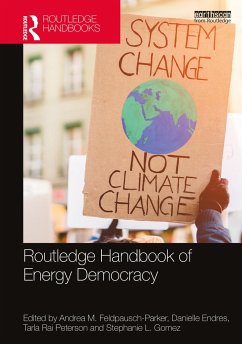Routledge Handbook of Energy Democracy
Herausgeber: Feldpausch-Parker, Andrea M.; Peterson, Tarla Rai; Endres, Danielle
Routledge Handbook of Energy Democracy
Herausgeber: Feldpausch-Parker, Andrea M.; Peterson, Tarla Rai; Endres, Danielle
- Gebundenes Buch
- Merkliste
- Auf die Merkliste
- Bewerten Bewerten
- Teilen
- Produkt teilen
- Produkterinnerung
- Produkterinnerung
This handbook offers a comprehensive transdisciplinary examination of the research and practices that constitute the emerging research agenda in energy democracy. A premier source for all students and researchers interested in the field of energy; including policy, politics, transitions, access, justice, and public participation.
Andere Kunden interessierten sich auch für
![The Routledge Handbook of Landscape Ecology The Routledge Handbook of Landscape Ecology]() The Routledge Handbook of Landscape Ecology294,99 €
The Routledge Handbook of Landscape Ecology294,99 €![The Routledge Handbook of Research Methods for Social-Ecological Systems The Routledge Handbook of Research Methods for Social-Ecological Systems]() The Routledge Handbook of Research Methods for Social-Ecological Systems304,99 €
The Routledge Handbook of Research Methods for Social-Ecological Systems304,99 €![Routledge Handbook of Ecocultural Identity Routledge Handbook of Ecocultural Identity]() Routledge Handbook of Ecocultural Identity304,99 €
Routledge Handbook of Ecocultural Identity304,99 €![Key Settlements in Rural Areas (Routledge Revivals) Key Settlements in Rural Areas (Routledge Revivals)]() Paul ClokeKey Settlements in Rural Areas (Routledge Revivals)206,99 €
Paul ClokeKey Settlements in Rural Areas (Routledge Revivals)206,99 €![Routledge Revivals: Kyoto Protocol (1999) Routledge Revivals: Kyoto Protocol (1999)]() Michael GrubbRoutledge Revivals: Kyoto Protocol (1999)174,99 €
Michael GrubbRoutledge Revivals: Kyoto Protocol (1999)174,99 €![Routledge Handbook of Ecosystem Services Routledge Handbook of Ecosystem Services]() Routledge Handbook of Ecosystem Services318,99 €
Routledge Handbook of Ecosystem Services318,99 €![Routledge Revivals: Energy II (1977) Routledge Revivals: Energy II (1977)]() Denton MorrisonRoutledge Revivals: Energy II (1977)153,99 €
Denton MorrisonRoutledge Revivals: Energy II (1977)153,99 €-
-
-
This handbook offers a comprehensive transdisciplinary examination of the research and practices that constitute the emerging research agenda in energy democracy. A premier source for all students and researchers interested in the field of energy; including policy, politics, transitions, access, justice, and public participation.
Hinweis: Dieser Artikel kann nur an eine deutsche Lieferadresse ausgeliefert werden.
Hinweis: Dieser Artikel kann nur an eine deutsche Lieferadresse ausgeliefert werden.
Produktdetails
- Produktdetails
- Verlag: Routledge
- Seitenzahl: 482
- Erscheinungstermin: 18. November 2021
- Englisch
- Abmessung: 250mm x 175mm x 30mm
- Gewicht: 1004g
- ISBN-13: 9781138392250
- ISBN-10: 1138392251
- Artikelnr.: 62800615
- Herstellerkennzeichnung
- Libri GmbH
- Europaallee 1
- 36244 Bad Hersfeld
- gpsr@libri.de
- Verlag: Routledge
- Seitenzahl: 482
- Erscheinungstermin: 18. November 2021
- Englisch
- Abmessung: 250mm x 175mm x 30mm
- Gewicht: 1004g
- ISBN-13: 9781138392250
- ISBN-10: 1138392251
- Artikelnr.: 62800615
- Herstellerkennzeichnung
- Libri GmbH
- Europaallee 1
- 36244 Bad Hersfeld
- gpsr@libri.de
Andrea M. Feldpausch-Parker is an associate professor of environmental and science communication at the State University of New York College of Environmental Science and Forestry (SUNY-ESF), USA. Danielle Endres is a professor of communication and affiliated faculty in environmental humanities at the University of Utah, USA. Tarla Rai Peterson is a professor of communication and affiliated faculty in environmental science and engineering at the University of Texas at El Paso, USA. Stephanie L. Gomez is an assistant professor of communication studies at Western Washington University, USA.
1. Energy democracy: An introduction Part I: Scalar Dimensions of Power and
Governance in Energy Democracy 2. Scalar dimensions of power and governance
in energy democracy: Introduction 3. International energy governance:
Opportunities and challenges for democratic politics 4. Comparing and
contrasting the institutional relationships, regulatory frameworks, and
energy system governance of European and U.S. electric cooperatives 5.
Energy democracy at the scale of Indigenous governance: Indigenous Native
American struggles for democracy, justice, and decolonization 6.
Conceptualizing energy democracy using the multiple streams framework:
Actors, public participation, and scale in energy transitions 7. Part One
response Part II: Discourses of Energy Democracy 8. Discourses of energy
democracy: Introduction 9. Energy security: From security of supply to
public participation 10. The premise and the promise: "Energy poverty,"
capabilities, and the language of moral commitments 11. A brief excursion
into the many scales and voices of renewable energy colonialism 12. Energy
dominance 13. Part Two response Part III: Grassroots and Critical Modes of
Action 14. Grassroots and critical modes of action: Introduction 15. The
state or the citizens for energy democracy? Municipal and cooperative
models in the German energy transition 16. Institutionalizing energy
democracy: The promises and pitfalls of electricity co-operative
development 17. A feminist lens on energy democracy: Redistributing power
and resisting oppression through renewable transformation 18. Energy
commons and alternatives to enclosures of sunshine and wind 19. Part Three
response Part IV: Democratic and Participatory Principles 20. Democratic
and participatory principles of Energy Democracy: Introduction 21.
Splitting (over) the atom: Nuclear energy and democratic conflict 22.
Public participation and energy system transformations 23. The complex
relations between justice and participation in collaborative planning
processes for a renewable energy transition 24. Participation in
non-democracies: Rural Thailand as a site of energy democracy 25. Part Four
response Part V: Energy Resource Tensions 26. Energy resource tensions:
Introduction 27. Energy democracy, nuclear power, and participatory
knowledge production about radiation risks 28. A fracked society:
Multi-state media analysis of hydraulic fracturing in the USA 29. Latin
American hydropower sacrifice zones 30. Postcards from the future: Hawaii's
transition to wind and solar energy 31. Part Five response Part VI: Energy
Democracies in Practice 32. Energy democracies in practice: Introduction
33. Carbon neutral pledges: Public opinions, opportunities, and challenges
for energy democracy 34. Beyond the Ivory Tower: Exploring the role of
universities towards sustainable energy transitions in post-disaster
environments 35. Low carbon energy democracy in the Global South? 36.
Energy democracy in practice: Centering energy sovereignty in rural
communities and Tribal Nations 37. Part Six response 38. Conclusion: The
future of energy democracies 39. Afterword: Energy democracy, Episode 196
of Cultures of Energy Podcast
Governance in Energy Democracy 2. Scalar dimensions of power and governance
in energy democracy: Introduction 3. International energy governance:
Opportunities and challenges for democratic politics 4. Comparing and
contrasting the institutional relationships, regulatory frameworks, and
energy system governance of European and U.S. electric cooperatives 5.
Energy democracy at the scale of Indigenous governance: Indigenous Native
American struggles for democracy, justice, and decolonization 6.
Conceptualizing energy democracy using the multiple streams framework:
Actors, public participation, and scale in energy transitions 7. Part One
response Part II: Discourses of Energy Democracy 8. Discourses of energy
democracy: Introduction 9. Energy security: From security of supply to
public participation 10. The premise and the promise: "Energy poverty,"
capabilities, and the language of moral commitments 11. A brief excursion
into the many scales and voices of renewable energy colonialism 12. Energy
dominance 13. Part Two response Part III: Grassroots and Critical Modes of
Action 14. Grassroots and critical modes of action: Introduction 15. The
state or the citizens for energy democracy? Municipal and cooperative
models in the German energy transition 16. Institutionalizing energy
democracy: The promises and pitfalls of electricity co-operative
development 17. A feminist lens on energy democracy: Redistributing power
and resisting oppression through renewable transformation 18. Energy
commons and alternatives to enclosures of sunshine and wind 19. Part Three
response Part IV: Democratic and Participatory Principles 20. Democratic
and participatory principles of Energy Democracy: Introduction 21.
Splitting (over) the atom: Nuclear energy and democratic conflict 22.
Public participation and energy system transformations 23. The complex
relations between justice and participation in collaborative planning
processes for a renewable energy transition 24. Participation in
non-democracies: Rural Thailand as a site of energy democracy 25. Part Four
response Part V: Energy Resource Tensions 26. Energy resource tensions:
Introduction 27. Energy democracy, nuclear power, and participatory
knowledge production about radiation risks 28. A fracked society:
Multi-state media analysis of hydraulic fracturing in the USA 29. Latin
American hydropower sacrifice zones 30. Postcards from the future: Hawaii's
transition to wind and solar energy 31. Part Five response Part VI: Energy
Democracies in Practice 32. Energy democracies in practice: Introduction
33. Carbon neutral pledges: Public opinions, opportunities, and challenges
for energy democracy 34. Beyond the Ivory Tower: Exploring the role of
universities towards sustainable energy transitions in post-disaster
environments 35. Low carbon energy democracy in the Global South? 36.
Energy democracy in practice: Centering energy sovereignty in rural
communities and Tribal Nations 37. Part Six response 38. Conclusion: The
future of energy democracies 39. Afterword: Energy democracy, Episode 196
of Cultures of Energy Podcast
1. Energy democracy: An introduction Part I: Scalar Dimensions of Power and
Governance in Energy Democracy 2. Scalar dimensions of power and governance
in energy democracy: Introduction 3. International energy governance:
Opportunities and challenges for democratic politics 4. Comparing and
contrasting the institutional relationships, regulatory frameworks, and
energy system governance of European and U.S. electric cooperatives 5.
Energy democracy at the scale of Indigenous governance: Indigenous Native
American struggles for democracy, justice, and decolonization 6.
Conceptualizing energy democracy using the multiple streams framework:
Actors, public participation, and scale in energy transitions 7. Part One
response Part II: Discourses of Energy Democracy 8. Discourses of energy
democracy: Introduction 9. Energy security: From security of supply to
public participation 10. The premise and the promise: "Energy poverty,"
capabilities, and the language of moral commitments 11. A brief excursion
into the many scales and voices of renewable energy colonialism 12. Energy
dominance 13. Part Two response Part III: Grassroots and Critical Modes of
Action 14. Grassroots and critical modes of action: Introduction 15. The
state or the citizens for energy democracy? Municipal and cooperative
models in the German energy transition 16. Institutionalizing energy
democracy: The promises and pitfalls of electricity co-operative
development 17. A feminist lens on energy democracy: Redistributing power
and resisting oppression through renewable transformation 18. Energy
commons and alternatives to enclosures of sunshine and wind 19. Part Three
response Part IV: Democratic and Participatory Principles 20. Democratic
and participatory principles of Energy Democracy: Introduction 21.
Splitting (over) the atom: Nuclear energy and democratic conflict 22.
Public participation and energy system transformations 23. The complex
relations between justice and participation in collaborative planning
processes for a renewable energy transition 24. Participation in
non-democracies: Rural Thailand as a site of energy democracy 25. Part Four
response Part V: Energy Resource Tensions 26. Energy resource tensions:
Introduction 27. Energy democracy, nuclear power, and participatory
knowledge production about radiation risks 28. A fracked society:
Multi-state media analysis of hydraulic fracturing in the USA 29. Latin
American hydropower sacrifice zones 30. Postcards from the future: Hawaii's
transition to wind and solar energy 31. Part Five response Part VI: Energy
Democracies in Practice 32. Energy democracies in practice: Introduction
33. Carbon neutral pledges: Public opinions, opportunities, and challenges
for energy democracy 34. Beyond the Ivory Tower: Exploring the role of
universities towards sustainable energy transitions in post-disaster
environments 35. Low carbon energy democracy in the Global South? 36.
Energy democracy in practice: Centering energy sovereignty in rural
communities and Tribal Nations 37. Part Six response 38. Conclusion: The
future of energy democracies 39. Afterword: Energy democracy, Episode 196
of Cultures of Energy Podcast
Governance in Energy Democracy 2. Scalar dimensions of power and governance
in energy democracy: Introduction 3. International energy governance:
Opportunities and challenges for democratic politics 4. Comparing and
contrasting the institutional relationships, regulatory frameworks, and
energy system governance of European and U.S. electric cooperatives 5.
Energy democracy at the scale of Indigenous governance: Indigenous Native
American struggles for democracy, justice, and decolonization 6.
Conceptualizing energy democracy using the multiple streams framework:
Actors, public participation, and scale in energy transitions 7. Part One
response Part II: Discourses of Energy Democracy 8. Discourses of energy
democracy: Introduction 9. Energy security: From security of supply to
public participation 10. The premise and the promise: "Energy poverty,"
capabilities, and the language of moral commitments 11. A brief excursion
into the many scales and voices of renewable energy colonialism 12. Energy
dominance 13. Part Two response Part III: Grassroots and Critical Modes of
Action 14. Grassroots and critical modes of action: Introduction 15. The
state or the citizens for energy democracy? Municipal and cooperative
models in the German energy transition 16. Institutionalizing energy
democracy: The promises and pitfalls of electricity co-operative
development 17. A feminist lens on energy democracy: Redistributing power
and resisting oppression through renewable transformation 18. Energy
commons and alternatives to enclosures of sunshine and wind 19. Part Three
response Part IV: Democratic and Participatory Principles 20. Democratic
and participatory principles of Energy Democracy: Introduction 21.
Splitting (over) the atom: Nuclear energy and democratic conflict 22.
Public participation and energy system transformations 23. The complex
relations between justice and participation in collaborative planning
processes for a renewable energy transition 24. Participation in
non-democracies: Rural Thailand as a site of energy democracy 25. Part Four
response Part V: Energy Resource Tensions 26. Energy resource tensions:
Introduction 27. Energy democracy, nuclear power, and participatory
knowledge production about radiation risks 28. A fracked society:
Multi-state media analysis of hydraulic fracturing in the USA 29. Latin
American hydropower sacrifice zones 30. Postcards from the future: Hawaii's
transition to wind and solar energy 31. Part Five response Part VI: Energy
Democracies in Practice 32. Energy democracies in practice: Introduction
33. Carbon neutral pledges: Public opinions, opportunities, and challenges
for energy democracy 34. Beyond the Ivory Tower: Exploring the role of
universities towards sustainable energy transitions in post-disaster
environments 35. Low carbon energy democracy in the Global South? 36.
Energy democracy in practice: Centering energy sovereignty in rural
communities and Tribal Nations 37. Part Six response 38. Conclusion: The
future of energy democracies 39. Afterword: Energy democracy, Episode 196
of Cultures of Energy Podcast








